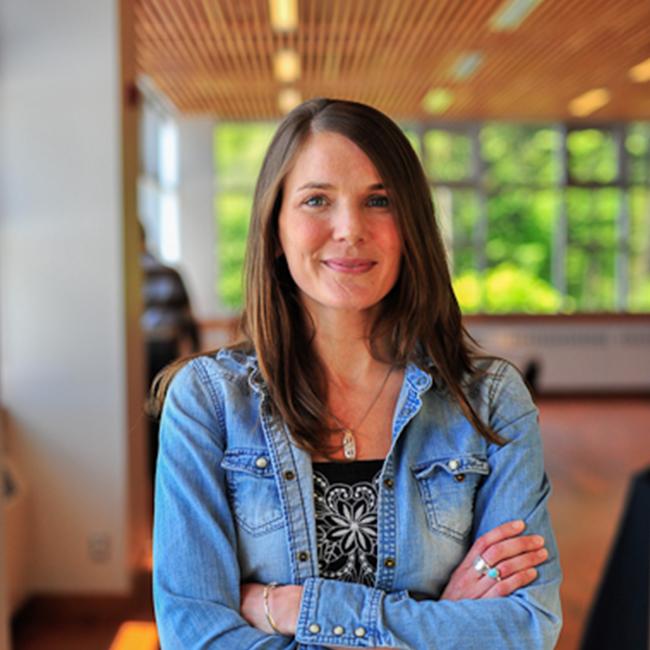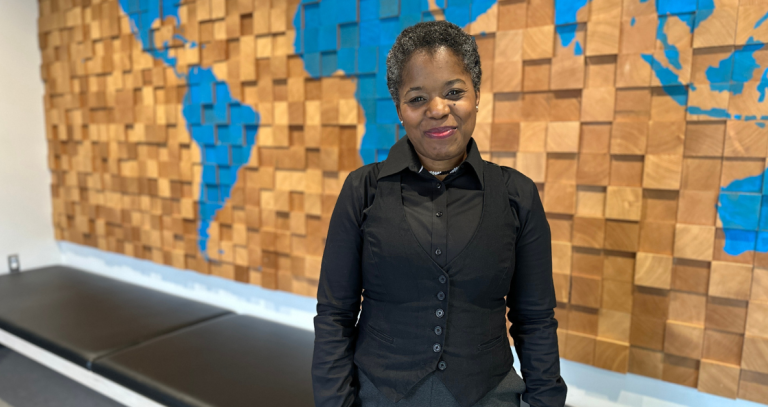Program description
Language, media, culture, technology.
Study these, and learn how clear communication moves solutions forward in business and society.
In the Bachelor of Arts in Professional Communication program, you'll become adept at professional writing, public relations, journalism, public speaking and digital communications.
You'll learn to persuade through words, graphics and storytelling.
You'll know what communication tools are available to you and how to use them.
All of this you'll study within a larger framework of media and cultural studies, sustainability, Indigenous contexts and globalization.
As a graduate, you'll have an education that balances classroom learning, professional experience, creativity and practical skills.
Study abroad
Customize your studies with a perspective-shifting international experience.
You can choose to study abroad for a semester at one of our partner universities in Sweden or Spain.
Learn more about studying abroad.
Who it’s for
This program is a good fit for students interested in a career in public relations, advertising, marketing and journalism, as well as corporate, technical and online communication.
Program delivery
Program options
There are two program options for the Bachelor of Arts in Professional Communication:
- Third-year entry (years three and four) for eligible students. This program can be completed in 12 months (on campus) or 24 months (fully online).
- coming soon: four-year undergraduate degree for students typically entering from high school (or equivalent)
Third-year entry (degree completion options)
You can complete this program in one of two ways:
- on-campus intensive over 12 months
- fully online over 24 months
12-month on-campus intensive
This intensive program option, delivered entirely on-campus, is ideal if you want to immerse yourself in your studies.
You'll take double the course load of the 24-month fully online program option and complete your degree in a shorter amount of time.
Studying on campus brings you together with your class colleagues and instructors. Expect the program to be rigorous. You’ll do homework, readings and team assignments outside of your full-time class hours.
You'll start your program with a non-credit, but required, course about academic integrity.
24-month online
This two-year fully online program includes online courses and virtual residencies.
This program has two two-week residencies.
Residencies are intensive and immersive. Many students say this time together is the highlight of their program.
During your residency, you can expect to:
- attend online classes full-time (e.g., Monday to Friday from 8 a.m. to 5 p.m.)
- complete homework and individual and team assignments outside of class hours
- take part in extracurricular activities
Online learning
Online courses consist of assigned readings, synchronous or asynchronous lectures and interactive discussions, and individual and team assignments.
You’re expected to meet deadlines and contribute meaningfully to your class. Your contributions are a big part of everyone’s learning.
You'll take one or two courses at a time. Courses last approximately 10 weeks, and each one requires approximately 12 to 15 hours of work per week.
You'll start your program with a non-credit, but required, course about academic integrity.
Courses
Faculty
Transfer agreements
Refine results
First-year entry (4-year undergraduate degree)
First-year entry is for students coming from high school (or equivalent). Please review the year 1 admission and application requirements for more information.
Third-year entry (degree completion - 3rd & 4th year)
Standard admission
- Completion of a diploma, or 60 credits, in communication, journalism, business administration, or general arts, including a minimum of 24 second-year credits, with a minimum GPA of 'B' (3.00/4.33) from a recognized post-secondary institution.
- Block transfer agreements: Communication
Flexible admission
Applicants who do not meet the standard admission requirements will be considered for flexible admission and assessed as follows:
- Normally, a minimum of five years of relevant work experience in the areas of communication, public relations, journalism or other related fields.
- Evidence of having sufficient knowledge, skills and abilities to complete a demanding academic course of study.
English Language Proficiency
- If English is not your primary language, please review our English language requirements.
Additional Recommendations
- Academic writing skills are required for success in this program and an English composition course focused on academic writing is therefore recommended. The Academic Writing and Critical Thinking course offered through Continuing Studies at Royal Roads University meets this recommendation.
Application requirements
First-year entry (4-year undergraduate degree)
First-year entry is for students coming from high school (or equivalent). Please review the year 1 admission and application requirements for more information.
Third-year entry (degree completion - 3rd & 4th year)
If you've completed some university or college courses, you may be eligible for the degree completion option, comprising of years 3 & 4 of this program. Before your file can be assessed for admission, the following information & supporting documents are required for entry to third year.
Application form
In order to apply online, you will be required to create a log-in account using your email address. You will be required to list all credit courses and/or programs you have completed or are currently enrolled in. If your application fees are being paid by a third party, review sponsored student information. Once submitted, you may check the status of your application at any time.
Missed your application deadline? While we can’t make any guarantees, we may be able to accommodate late applications if there's still space and enough time to process. If you're interested in an intake that is now closed to applications, apply for the next available intake and email Admissions with your preferred start date. Make sure you’re prepared to submit your program's required documents right away. We can't make an admissions decision without them.
Official transcripts
Applicants are responsible for arranging for the submission of official transcripts from ALL post-secondary (higher education) institutions currently or previously attended, for all credit courses and/or programs. Transcripts are not required for non-credit programs or courses, though some programs may require proof of professional certifications or designations.
Transcripts are considered official only if submitted directly by the Registrar or other recognized authority of the providing institution in the institution's original, sealed envelope. If the envelope has been opened, the transcripts are no longer official and new (official) transcripts will be required to complete your application.
All international transcripts or credentials are subject to an international transcript and/or credential evaluation.
Additional requirements for flexible admission
For applicants who will be reviewed under the flexible admission process the following additional supporting documents will be required:
Personal statement
Your personal statement should be at least a two-page letter indicating your motivation for seeking entrance to the program. Your statement should comment upon your personal and career goals, the expectations you have for the program in relation to the achievement of your goals, and the strengths you feel you can bring to the program. Please expand upon why you think your life and work experience and/or related formal education and courses merit adjudication under the Flexible Admission process.
Letter of reference
Typically, applicants will provide one reference that should consist of the following:
- Academic Reference: This letter should attest to your performance in the context of your current or previous studies. The letter can address such areas as academic achievement, study skills, teamwork, leadership potential, human relations, flexibility, communication, and technical skills.
- Professional Reference: This letter should attest to your current or previous performance in your professional life. The letter can address areas such as communication skills, interpersonal and leadership skills, management potential, work ethic, etc.
Detailed résumé
- Education: List all post-secondary education, degrees, diplomas, and certificates you have achieved.
- Work Experience: Please include name of organization, position, length of service (month and year), and a brief description of duties.
- Voluntary / Unpaid Work Experience: List and describe any voluntary/unpaid post-secondary employment and/or community service experience. Please include the name of the organization, length of service, and a brief description of duties. List positions you have held in this service.
- Information Technology Training and Experience: Briefly describe your level of training and experience in the use of information technology including computers, software and telecommunications networks as tools for business, education, teaching and personal use.
- English Language Skills: List English (and related) courses completed, which will also appear on your official transcript(s). Include any other experience of written or spoken English (e.g. published writing, prizes and awards, debating club membership, etc.) that may assist us in adjudicating your application for admission.
- Professional memberships/affiliations: List memberships and positions you hold/have held in professional associations, service clubs, community/volunteer sector.
- Other relevant information: Provide any other information which you believe is relevant to your application and will be of assistance to the review committee.
Portfolio (upon request)
Your portfolio should include digital samples (disk or flash drive) of completed work such as projects you have managed, reports, published writing, syllabus outlines of courses you have taught, etc. A portfolio is especially useful for those applicants who have career experience but lack the formal requirements for admission and wish to apply through our Flexible Admission process.
If applicable
- Applicants declaring permanent resident or Convention Refugee status in Canada, must submit a copy of their Permanent Resident Card (PR card) along with their application.
- Transcript evaluation fee or credential evaluation report, if submitting international transcripts.
- An official English language proficiency score report or other evidence of proficiency if English is not your primary language.
- Other information or documents as may be requested to determine your eligibility.
For information on how and where to send your supporting documents, please refer to the document submission guidelines.




